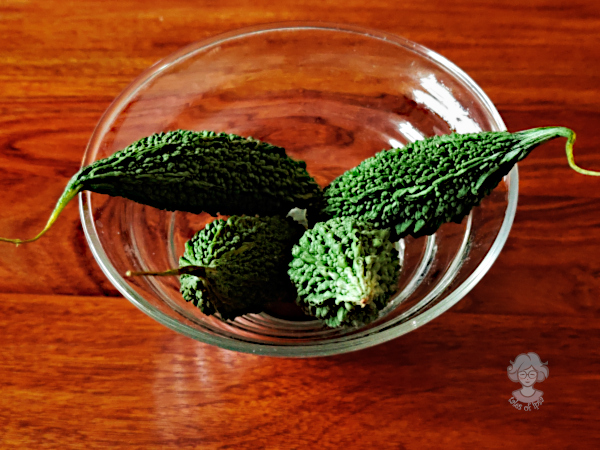Among my many wonderful childhood memories of food lurks one bitter foe. A mouthful of bitter melon, to be precise. Aka the bitter gourd or karela or uchche. It turned up regularly on our lunch platter, being considered a superfood, though of course, the term itself had not been invented then!
It all came back to me as I watched a food show the other day. The recipe involved multiple steps – all designed to decrease the bitterness of the bitter gourd! Sprinkling with salt and vinegar; draining, squeezing, and washing it, adding a sprinkling of sweet and a dash of the sour to make it palatable. Which seemed somewhat pointless as we were always told that it was the bitterness that was good for us. And after all, it was born to be bitter!
the virtuous bitter gourd
I decided to investigate. A quick internet search threw up hundreds of articles, all with ‘scientific’ claims, singing paeans to the bitter gourd. Traditional medicine lists its numerous virtues – not content with pacifying pitta and kapha and balancing your doshas; it detoxifies your entire system, controls/cures/prevents diabetes, boosts circulation and even improves libido! If that fails to impress you there is more – it reduces body fat, gives you glowing skin and hair, and will also cure a hangover! With such a vast repertoire of virtues, the bitter gourd should have replaced the apple in the well-known proverb. ‘A mouthful of bitter melon keeps maladies away.’
What I found even more interesting was that taste and taste buds developed to help us choose food which was good for us. And bitterness was meant to warn us off potentially toxic food!
So what is happening here? Are we going against nature by deliberately swallowing the bitter? Or are our senses leading us astray?
bitterness decoded
So is bitter better? As of now, there is no research which proves that a diet rich in bitters is better than a regular vegetarian diet. The vitamins, minerals, antioxidants found in bitter food are also found in many non-bitter or not-so-bitter green vegetables! So banish the bitter melon if you don’t fancy it.
What is known is that bitter food stimulates digestive enzymes, modulates gastric emptying and gut motility; thus helping us digest our meal. A small helping of bitter greens, or the mouthful of bitter melon that is often served at the start of the meal in many traditional societies, is therefore good for digestion. But you could just as well have a pre-dinner aperitif – like a classic gin and tonic! Or a post-prandial coffee! Or (my favourite) – a nibble of dark chocolate!
Everyone would heartily concur that bitter food suppresses hunger and food-cravings. A bitter melon a day, (or one before every meal), is very likely to kill your appetite, make you consume fewer calories and help you lose weight. So go ahead, start your day with a glass of karela juice if you must. Be warned though. What may be good for the waistline may not do much for your mood!
But there are those who genuinely like the stuff. Science offers an explanation here too. Our taste buds are not alike, nor uniform in sensing bitterness. Some genes make us sensitive to very small amounts of bitter compounds, while others make us ‘non-tasters‘ or the ‘bitter-insensitive.‘ So love it or hate it – its all in your genes!
The bitter pill
Bitterness became associated with medication, and the term ‘bitter pill’, was first used only in the 18th century. However, plant-based bitter alkaloids have been used in various ancient cultures for treating the sick since millennia. The best known of these is, of course, quinine, first used by the Incas against malaria. Bitterness thus became associated with wellness; and the antidote to sickness. Quinine was popularised in tonic water by the European colonisers; but it is no tonic or elixir, and can cause serious side-effects.
The reason we assign great virtue to bitter food is perhaps the metaphor for life they represent. Just as we believe that unpleasant experiences serve a higher purpose – that adversities strengthen our resolve, toughen our moral fibre and are generally ‘good for our soul’, so too we believe that bitterness acts in mysterious ways to cleanse and strengthen our physical bodies.
bittersweet
Bitter medicine, bitter food and the bitter truth are thus perceived as being good for us – unpalatable but wholesome. As not-so sapient humans, we know not what is good for us; and need a good dose of the bitter to be able to savour and appreciate sweetness.
In my native Bengal, we prepare a mixed vegetable stew called ‘shukto’. The bitter gourd is an essential ingredient, but it is delicately balanced with just a little sugar in a smooth gravy of poppy seed and milk, making the bitterness at once palatable, even desirable. The perfect bittersweet metaphor for life.
